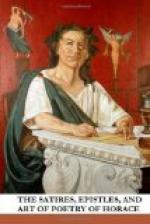Those who have tact their poverty to mask
Before their chief get more than those who ask;
It makes, you see, a difference, if you take
As modest people do, or snatch your cake;
Yet that’s the point from which our question
starts,
By what way best to get at patrons’ hearts.
“My mother’s poor, my sister’s dower
is due,
My farm won’t sell or yield us corn enow,”
What is all this but just the beggar’s cry,
“I’m starving; give me food for charity”?
“Ah!” whines another in a minor key,
“The loaf’s in out; pray spare a slice
for me.”
But if in peace the raven would have fed,
He’d have had less of clawing, more of bread.
A poor companion whom his friend takes down
To fair Surrentum or Brundisium’s town,
If he makes much of cold, bad roads, and rain,
Or moans o’er cash-box forced and money ta’en,
Reminds us of a girl, some artful thing,
Who cries for a lost bracelet or a ring,
With this result, that when she comes to grieve
For real misfortunes, no one will believe.
So, hoaxed by one impostor, in the street
A man won’t set a cripple on his feet,
Though he invoke Osiris, and appeal
With streaming tears to hearts that will not feel,
“Lift up a poor lame man! I tell no lie;”
“Treat foreigners to that,” the neighbours
cry.
XVIII. TO LOLLIUS.
Si Bene Te Novi.
You’d blush, good Lollius, if I judge you right,
To mix the parts of friend and parasite.
’Twixt parasite and friend a gulf is placed,
Wide as between the wanton and the chaste;
Yet think not flattery friendship’s only curse:
A different vice there is, perhaps a worse,
A brutal boorishness, which fain would win
Regard by unbrushed teeth and close-shorn skin,
Yet all the while is anxious to be thought
Pure independence, acting as it ought.
Between these faults ’tis Virtue’s place
to stand,
At distance from the extreme on either hand.
The flatterer by profession, whom you see
At every feast among the lowest three,
Hangs on his patron’s looks, takes up each word
Which, dropped by chance, might else expire unheard,
Like schoolboys echoing what their masters say
In sing-song drawl, or Gnatho in the play:
While your blunt fellow battles for a straw,
As though he’d knock you down or take the law:
“How now, good sir? you mean my word to doubt?
When I once think a thing, I mayn’t speak out?
Though living on your terms were living twice,
Instead of once, ’twere dear at such a price.”
And what’s the question that brings on these
fits?—
Does Dolichos or Castor make more hits?
Or, starting for Brundisium, will it pay
To take the Appian or Minucian way?




